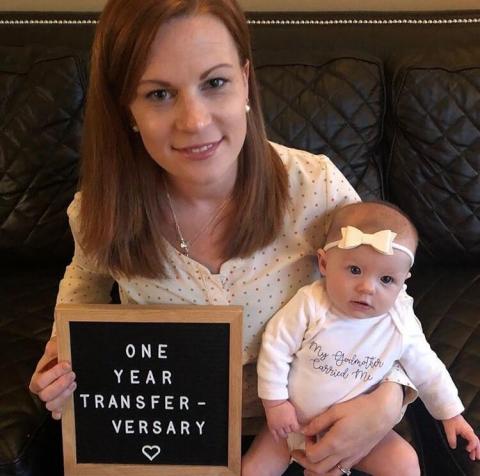Rachel Checolinksi, a 34-year-old mother of three, had watched for years as her best friend suffered through years of infertility treatments and what would eventually be six miscarriages. Checolinksi wanted to help support her in any way possible, and began to consider the possibility that she should offer to be a gestational surrogate for her friend.
But Checolinksi, who describes herself as “born again” Christian and attended a Pentecostal church in Fond du Lac, Wis., at the time, wanted to know if her faith had anything to say about the idea. So in 2016, she approached her pastor’s wife about the situation and was surprised to learn that the pastor’s wife had also offered to be a surrogate to help another infertile friend.
“She really believed in what I was doing,” said Checolinksi. “The only reason that she didn’t [become a surrogate] was that she ended up having to have a hysterectomy.”
Eloise Drane, a 44-year-old mother of five in Atlanta, Ga., approached the pastor of her nondenominational Christian church with a similar question in 2007. Drane had donated a kidney to a cousin when she was 23, as well as six rounds of egg retrievals to infertile couples before she became more serious about her faith.
In her work with a surrogacy agency, she had begun to wonder if she had it in her to actually carry a pregnancy for another family — and if doing so would be a sin.
“[My pastor] didn’t necessarily give me a ‘yes’ or ‘no’ answer,” said Drane. “What he told me was, ‘You need to go back into the Bible and you need to start reading from the beginning of Jesus — and you really need to listen.’”
thumbnail_rachel_checolinksi.jpg

It should come as no surprise that Christianity, an ancient faith with an immense diversity of sects, has no official or unified stance on gestational surrogacy except for in large, hierarchical denominations like the Catholic Church or the Russian Orthodox Church, who refer (respectively) to surrogacy as “gravely immoral” and a violation of “the profound emotional and spiritual intimacy that is established between mother and child already during the pregnancy.”
But as more states pass laws to legalize commercial gestational surrogacy, which involves paying the surrogate a fee for the pregnancy on top of reimbursing her for medical and living expenses, voices from across the Christian spectrum are speaking out both for and against the practice and exposing a theological rift not just about surrogacy, but about all reproductive technologies available today.
Surrogacy laws met with criticism from feminists and Christians
Gestational surrogacy, which is the dominant form of surrogacy practiced today, dates back to 1985. As opposed to traditional surrogacy, in which the surrogate is also the genetic parent, gestational surrogacy involves creating an embryo in a lab and transferring it to a different woman to gestate for the intended parents.
Oklahoma became the 11th state to explicitly legalize commercial surrogacy last week with regulations and protections for both intended parents and prospective surrogates, while New York’s legislature is working through the final details of a similar bill that has the support of the governor.
Advocates for gestational surrogacy say that it’s crucial for helping couples who are infertile or gay conceive a child that is genetically related to at least one parent. And progressive laws like the one passed in Oklahoma have specific protections for each party in the surrogacy arrangement to make a potentially fraught experience one that’s safer for all parties. They include requiring mental health screening for prospective surrogates and automatically listing the intended parents on the child’s birth certificate.
New York’s bill mandates that surrogates be at least 21 years old. It also gives these women the sole right to decide whether to terminate the pregnancy or reduce the number of fetuses she is carrying, a common point of contention in surrogacy cases gone wrong. In other words, even if the intended parents may desire to carry fewer fetuses to term or to terminate a pregnancy if a fetus has health defects, only the surrogate can make that decision. For this reason, when matching surrogates and intended parents, both parties are encouraged to discuss their views on pregnancy termination before beginning the surrogacy process.
If the law passes in New York, two more states — Michigan and Louisiana — will be the only ones with laws that either ban commercial surrogacy outright or consider surrogate contracts unenforceable. U.S. states favorable to commercial surrogacy, like California, are global destinations for people who want to have a child through surrogacy, as the practice is illegal in most European countries.
The number of couples or individuals who use surrogacy to grow their families is small, but growing. In 2017, the last year for which this data is available, 3,678 babies were born in the U.S. through this process, according to the American Society for Reproductive Medicine. But this number is almost four-fold what it was in 2004.
Some criticism of commercial surrogacy comes from feminist groups concerned about the potential exploitation of women, but most of it comes from a faith-based perspective. Pro-life groups object to gestational surrogacy because it depends on in vitro fertilization which can create a large number of unused embryos, and Catholic groups say the practice “treats children as commodities to be manufactured, bought and sold.”
Seminaries and churches have a lot of catching up to do when it comes to educating pastors and congregants about these complex issues, said Scott Rae, professor of Philosophy and Christian Ethics at Biola University and co-author of the book, Outside the Womb: Moral Guidance for Assisted Reproduction.
Rae is not in favor of commercial surrogacy arrangements and thinks that surrogates should have some legal right to the child based on her “sweat equity” — that is, the time and effort she puts into growing the pregnancy.
“There’s an argument to be made that the woman who gives birth to the child actually ought to have some rights to the child that she’s carrying, based on the significant contribution that she’s making to the development and well-being of the child,” said Rae. “I’m troubled a bit by the way gestational surrogates are referred to sometimes as human incubators or prenatal babysitters, and I don’t think this does justice to what we know takes place developmentally in the womb.”
Rae is also troubled that congregants like Checolinksi and Drane could get such disparate advice from protestant church leaders about surrogacy.
“The fact that theological guidance on this is all over the map suggests that in a lot of our churches and seminaries, we’re not doing a lot of thinking about some of these issues in bioethics,” he said. “As a result, I think our churches are biblically under-educated when it comes to not only surrogacy, but other reproductive issues like abortion and end of life.”
Gerald Winslow, who wrote the first draft of what would eventually become the Seventh-day Adventist’s official statement on assisted human reproduction, said that their 1994 statement against reproductive treatments involving surrogates and gamete donors was primarily about taking a position against the commercialization of procreation.
But he also wanted to make a distinction, at least for his denomination, between official proclamations and the way they play out in local churches. Winslow, who is director for the Center for Christian Bioethics at Loma Linda University, said he knew of no pattern of punishing, disciplining, or disfellowshipping worshippers who decided to use reproductive treatments to expand their families.
“Adventists are much more attached to the notion of individual conscience,” he said. “Such a couple would be encouraged to think it through and read the guidelines,” and then are invited to make their own decision about it.
For instance, Winslow praised scholars like Grace Kao of Claremont School of Theology, herself a surrogate, who proposes a feminist Christian perspective on the ethics of surrogacy. Kao underwent an “altruistic” surrogacy — so-called because she didn’t receive any financial compensation for the experience except for medical reimbursements and costs related to the pregnancy. She bore a child for friends who had tried to conceive, and then adopt, a child for ten years without success.
In a speech she delivered in 2017, Kao said that Christians could view altruistic surrogacy as “collaborative procreation” and an example of “God at work to alleviate human suffering” through the use of medical science.
“When the process goes well, gestational surrogacy can serve as a metaphor for a deep truth of our Christian tradition, which is this: The bringing of children into the world was always intended to be a communal affair, not simply the task of the parents alone,” Kao said in the speech.
thumbnail_fullsizer_3.jpg

She also argued that those who are against surrogacy out of concerns for the surrogate should actually listen to the women who enter into these arrangements. Research shows that most women become surrogates because of a deep sense of charity, a desire to bring life into the world, and to help others experience parenthood — and this goes for both compensated and uncompensated surrogates.
Winslow called Kao’s presentation on her story and the ethics of surrogacy “exemplary” and said that in her own way, she would fit in with Adventist guidelines.
He also cautioned against the notion that there could be any one clear-cut, biblical perspective either for or against surrogacy in general, noting that ancient practices like polygamy and Levirate marriage described in the Bible are difficult to compare to modern day medical surrogacy.
“For people who are Bible-believing Christians and who take scriptural guidance seriously, you’re not going to find a specific text that governs this kind of practice,” Winslow said.
Regardless of how religious leaders advise their congregations, the majority of Americans seem to have already made up their mind about surrogacy. A 2015 YouGov poll found that 71 percent of Americans approve of surrogacy, and that 57 percent approve of commercial surrogacy. Even Americans who said that religion was “very important” to them generally approve of commercial surrogacy, with 48 percent supporting it versus 31 percent who don’t.
These attitudes could be tied to more positive portrayals of surrogacy in the mainstream media, as well as research on the health and wellbeing of gestational surrogates and their offspring.
A 2015 systematic review of 55 studies on children born into arrangements that take place within a single country finds there is no evidence of harm to them. A 2015 study on 20 surrogates in the UK found that they did not regret carrying a child for another couple 10 years after the fact, and that their expectations for a continuing relationship with the parents and child had been either met or exceeded.
The studies were small, and may not apply to women from developing countries who undergo surrogacy for parents in wealthier nations. But they do align with Checolinksi and Drane’s experiences.
How surrogates of faith feel about criticism
Though Drane’s pastor refused to give a ‘yes’ or ‘no’ answer to her question, she ended up becoming a surrogate and carried a twin pregnancy for a couple who had been rendered infertile by cancer. She then went on to enter into two more commercial surrogacy arrangements for two other families before eventually needing a hysterectomy after complications from her final birth.
In total, she estimates she earned about $75,000 from the three surrogate pregnancies, and she ended up launching her own surrogacy agency in the process. While this may sound like a lot of money, Drane points out that when you do the math on the time spent being pregnant or recovering from pregnancy for more than three years in total, it doesn't even amount to minimum wage. She maintains that her faith was the primary motivator for these arrangements.
Drane said she can see the “hand of God” in everything that she has experienced as a surrogate — even her hysterectomy, which she took to mean that she was finally finished with her calling. She also has no patience for critics who liken the arrangement to “prostitution.”
“Why is it prostitution? Because she’s choosing to help someone else?” Drane said. “If I went and gave blood, is that prostitution? I gave my kidney to my cousin, is that prostitution?”
Checolinksi also decided to carry the pregnancy for her friend, and did so in an altruistic arrangement.
She gave birth to her friend’s daughter eight months ago and said the experience has strengthened her and her husband’s belief in God. She hopes that people of faith learn more about the surrogacy process and come to see it as a beautiful thing, as opposed to something that is out of bounds for Bible-believing Christians.
While no one has personally approached her to criticize her surrogacy, she knows that one of the most common critiques about the practice is that it is “un-biblical.”
“It’s not biblical because it wasn’t medically possible in those days,” she said. “Are you not supposed to use antibiotics because it’s not in the Bible?”
Got something to say about what you're reading? We value your feedback!







